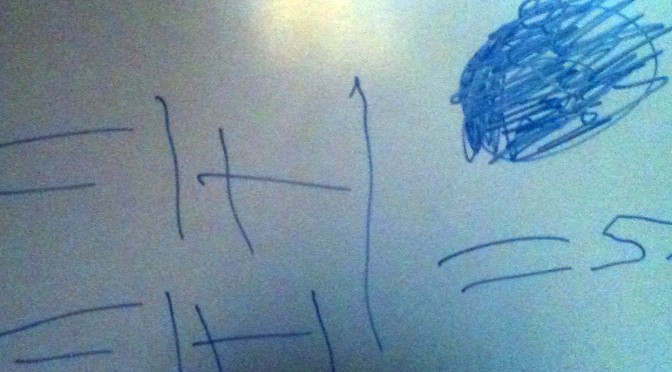I do think that sometimes 1+1=5. That doesn’t make me crazy. It means that we ought to account for our own blind spots. To help me explain, I’ve recruited my own daughter.
As you can see, she has written an interesting equation on the white board. She is so proud of it, she wrote it over and over again:
1=1+1
People fall into two camps when they see this:
Stern Father: She has written an incorrect equation and it must be corrected, otherwise she is likely to make it again. We must drill it into her brain that 1+1=2, not 1! She must also learn the proper order of placing the two numerals at the beginning! We don’t want to raise an idiot!
Nurturing Parent: She is exploring her understanding of numbers and symbols. From this equation, she clearly does not understand basic arithmetic, but what 3 year-old does? It is developmentally appropriate for her to play this way, because eventually she will get it.
 I am a nurturing parent and tend to take this view, but I’ve been questioning one thing that both of these responses take for granted: that 1+1 always =2. The unspoken truth in our worldly systems is that they are created by adults and we demand our small children be indoctrinated into them. Arithmetic is incredibly useful and I don’t suggest we should change anything about it. What I’m saying is that it is ours and we demand our children adapt to it at a very early age.
I am a nurturing parent and tend to take this view, but I’ve been questioning one thing that both of these responses take for granted: that 1+1 always =2. The unspoken truth in our worldly systems is that they are created by adults and we demand our small children be indoctrinated into them. Arithmetic is incredibly useful and I don’t suggest we should change anything about it. What I’m saying is that it is ours and we demand our children adapt to it at a very early age.
The second thing is that when we adopt an understanding that children can teach us something (a theory repeated several times in the gospels by Jesus, mind you), we might wonder when we’ve been wrong. When does 1+1 not =2 or when might 1+1=5?
When looking at the white board, it appears as if my daughter has written a pretty fascinating equation:

1=1+1=5=0
If we cast off the eyes that see only gibberish, but eyes that see encouragement, we might take an interesting idea.
What if our understanding of 1 is of the individual? We begin by presupposing that everything around us is built on us, the 1. So what happens when we add another person? We get a much bigger number, beyond exponential growth (5). But we also get nothing (0). Is there anything more profoundly existential than that? As individuals we can become community or nothing.
Or what if 1 represents unity: the coming together of individuals as 1? In this way 1+1 certainly does = 1, just as 200 million + 200 million equals 1. We can be stronger than we really are (5) or powerless (0) depending on how we treat each other.
Of course I’m not so deluded by my daughter’s genius to believe that she regards these symbols as you or I would. But I refuse to ignore the existential truth revealed in her play.
If we are being honest to what truth actually is, without coloring it through the prism of patriarchal authoritarianism, we would recognize the wisdom of children and that truth is truth, regardless of who reveals it. And perhaps the greatest truth revealed by my daughter is that our system of differentiation may inevitably lead not to unity, but to failure.


Leave a Reply